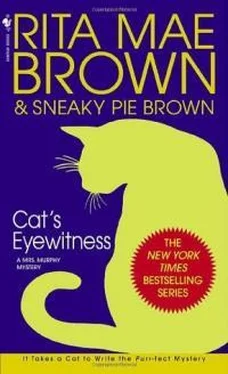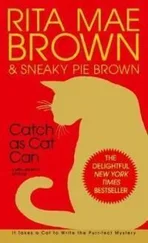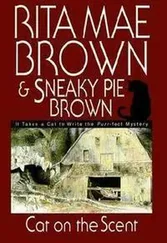"He has put my brethren far from me, and my acquaintances are wholly estranged from me. My kinsfolk and my close friends have failed me." Brother Handle, heart sinking, quoted Job, Chapter 19, Verses 13 and 14.
He touched the box, cold to his fingertips. The pipe, too, was cold but not freezing.
He didn't know how long he remained there, cramped under the larger pipe. He blinked and shook his head to clear it, then moved backward before standing up.
He whispered to himself the lament of Job, "My brethren far from me."
37
Staring into the silver bowl, three feet across, engraved with the details of a steeplechase victory by Mini's grandfather, Angus Urquhart, Susan was mesmerized as she stood in the large center hallway, Persian carpets underfoot.
"Ma'am." The short gentleman in livery behind the bowl held up a silver cup, the long, graceful curving ladle in his right hand.
"Hank, I can't get used to seeing you in livery."
"Mizz Big"—he referred to Big Mim by the nickname her staff called her—"does everything tiptop. How do you like Gretchen in her do?"
Gretchen, Big Mim's right hand, the woman who truly ran Dalmally, wore a mobcap with a low-cut eighteenth-century gown in deep maroon. Over that she wore a starched bright white apron. During the mid-eighteenth century it wasn't uncommon for women to be well dressed with an apron over their skirts. This protected the dress while they served or did anything messy. They removed the apron when dining or dancing. What set apart the lady of the house from the servants wasn't so much the fabrics, because a rich household dressed the servants with great care and at great expense. The dividing line for women was jewelry.
Mim, queen of Crozet, mourned the loss of elegance. She would quote Talleyrand: "He who did not live in the years before the Revolution cannot understand the sweetness of living."
Rev. Herb Jones would reply that it depended on one's station. An aristocrat might live very well but then again could be impoverished. A merchant might live like a prince although not be allowed a coat-of-arms or any such distinction. A skilled laborer might also enjoy the fruits of his labors. And then there were the hundreds of thousands who toiled, who sowed but did not reap. What sweetness life held would be found under a woman's petticoats, in the bottle, or perhaps one sunny day when the fellow found a gold coin on the road.
To this Big Mim argued that the century is not that important when it comes to the suffering masses. There will always be millions on the bottom. No amount of social engineering has ever figured out how to truly distribute wealth without either punishing the enterprising, murdering the aristocrats, or burning up resources in wars.
Perhaps she was right. The twenty-first century displayed no signs of a solution, although the leveling tendencies flared up regularly.
When Susan beheld the gargantuan punch bowl, she was overwhelmed with its workmanship, including the perfection of the cursive engraving.
Harry walked up next to her. "Every time I see this bowl, which Mim breaks out for her extravaganzas, I think the damned thing must be worth over a hundred thousand dollars. It's lined in gold, for Christ's sake."
Susan tipped back her head and laughed. "Harry, you are so predictable."
"What did I do now?"
"Not one thing. You're just you." Susan accepted the filled silver cup from Hank with an appreciative nod.
"Mizz Harry?"
"Hank, I need a tonic water with lime. I'll go to the bar for that. Can't drink eggnog."
"Jim mixed it up himself. The first cup will taste ever so delicious." His eyes sparkled. "The second cup will make you roar like a lion. If you drink a third, we'll carry you out of here feetfirst." His deep laugh rumbled.
"Thanks for the warning." Susan peered into her cup, a sprig of fresh mint floating on top along with a little sprinkle of nutmeg. The mint was Jim's special touch when he gave instructions to Hank.
"Now, you know, Mizz Big cooked up her orange blossoms. A little less lethal." Hank winked.
"Thanks. Merry Christmas, Hank."
"You, too, ladies."
As Susan accompanied Harry in her fight to reach the bar, she said, "Did you notice the color of the eggnog in the bowl?"
"Yeah."
"Living room. I want that color in the living room."
"I thought you were only painting two rooms and that wasn't one of them." Harry snaked through two rotund guests whose stomachs nearly touched.
"I know. I'm getting carried away. But I'll pay you."
"Don't be silly I actually like painting. But what I'll do is get a large batch mixed up; I don't want to go back and have a second mix. Never quite matches up, I swear it. Anyway, I'll get enough for my living room, too. That can be your Christmas present to me."
"I'm still getting the better deal."
"Actually, I am, because I've got you for my best friend." Harry smiled, her teeth exceptionally white.
After getting a large tonic water with a slice of lime, the two friends pushed through to the living room, a festival of white, red, and gold. Red and gold were Big Mim's stable colors, as well.
In this part of the world, even if a person had one acre with a run-in shed on it, they displayed stable colors, often in a small square on their truck on the driver's side, certainly on the sign to their place. It added color to country already steeped in nature's colorful wardrobe. Even winter greeted the eye with white, all shades of gray, mauve, purple, and brilliant red holly berries set against dark, glossy green. The sky gleamed intense robin's egg blue or true turquoise, at night giving way to pink, salmon, every shade of scarlet to purple.
The living room, indeed every room but those upstairs, bulged with friends, acquaintances, a smattering of nonfriends and a few enemies. The ages ranged from a few months old to Aunt Tally, closing in on one hundred. The net worth spanned less than twenty thousand dollars a year to over seven billion dollars. And there wasn't only one billionaire in the room. There were folks who could neither read nor write and those who made their living with language. The mix, heady, even combustible, represented a true Virginia party, and it was perfect.
Most everything Big Mim did was perfect. She didn't cotton to not being the richest person at the party, but she made certain she was the most charming, elegant, and hospitable. Her legendary aesthetic abilities were much in evidence, and in this department she had hot competition. Again, it was Virginia. Colors had to be subtle, furniture had to be hand-built from exquisite woods, floors, often hundreds of years old, had to glow with the patina of time. If your house looked as though you'd spent a fortune decorating it, you were already off the board. This, of course, made the competition for beautiful homes and inviting interiors much, much harder. Big Mim ran first, although Alicia ran a close second and BoomBoom wasn't far behind: win, place, show.
Then there was Harry, valiantly bringing up the rear. But she was cherished because she knew what was good and because she didn't violate the integrity of her old farmhouse. Then, too, everyone knew she didn't have the money to do it right.
Tazio Chappars, from a wealthy African-American and Italian family in St. Louis, endured an adjustment period when she first moved to Albemarle County. Being an architect, she had definite ideas about design and she loved interior decorating even though it wasn't her profession. Defiantly, she decorated her attractive clapboard house in a minimalist style. After two years she found that bored her. She began to be seduced by Wedgwood blues, putty grays, seaweed greens. The soft curve of the back of a Sheraton sofa sang a siren song. When her two brothers visited her, they teased her but they had to admit, a softness, a welcome comfort, was part of her home and life.
Читать дальше












